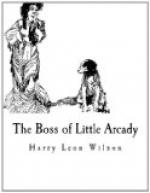She was an Episcopalian. Her line had been born Episcopalians since a time whereof no data were obtainable; and this was, of course, not a condition to meddle with in late life, even if one’s mind should grow consenting. For that matter, Miss Caroline would be frank and pretend to no change of mind. She was an old woman and fixed. She could not at this day free herself of a doubtless incorrect notion that the outside churches—meaning those not Episcopal—had been intended for people other than her own family and its offshoots. Clem had once been a Baptist, and it was true that he was now a Methodist. He had told her that his new religion was distinguished from the old by being “dry religion”. But these were intricacies with which a woman of Miss Caroline’s years could not be expected to entangle herself. This she would say, however, that during her residence in Little Arcady she would fling aside the prejudice of a lifetime and worship each Sabbath at the minister’s Methodist church.
It did not seem to the minister that she said it as might an explorer who consents for a time to adopt the manner and customs of the tribe among which a spirit of adventure has led him. He accepted her implied tribute modestly and with unaffected gratification, again wiping his brow and his broad, good face.
When I joined them at four o’clock, having been moved by hope of a cooling chat with Miss Caroline, the minister was slightly more flushed, I thought, than the day could warrant. He was about to leave, was, in fact, concluding his choicest anecdote of “Big Joe” Kestril—for he was a man who met all our kinds. “Big Joe,” six feet, five, a tower of muscled brawn, standing on a corner, pleasantly inebriated, had watched go feebly by the tottering, palsied form of little old Bolivar Kent, our most aged and richest man. The minister, also passing, had observed Kestril’s humorous stare.
“The big fellow called to me,” he was saying to Miss Caroline as I came up. “‘Parson,’ said he—they all know me familiarly, madam—’Parson,’ said he, ’I wish I could take all I’m worth and all old Kent is worth and put it in a bunch on the sidewalk there and then fight the old cuss for it!’”
It was a favorite anecdote of the minister’s, but I had never known him before to tell it to a lady on the occasion of his first call. Miss Caroline laughed joyously as she turned to greet me.
“I can’t tell you how finely I’ve been entertained,” she said to me.
“Nor can I tell him for myself, madam,” retorted the minister. I thought indeed he spoke with an effort that made this gallantry seem not altogether baseless in fact.
“I was on the point of leaving,” said the minister.
“Are you returning home, or have you more calls in the neighborhood?” I asked, feeling just a tinge of uneasiness about his expansive manner.
“No more calls, no. I had planned, instead, a pleasant walk up along the riverside to a spring some distance above. I mean to procure a supply of this delicious mint—for mint juleps,” he added affably.




